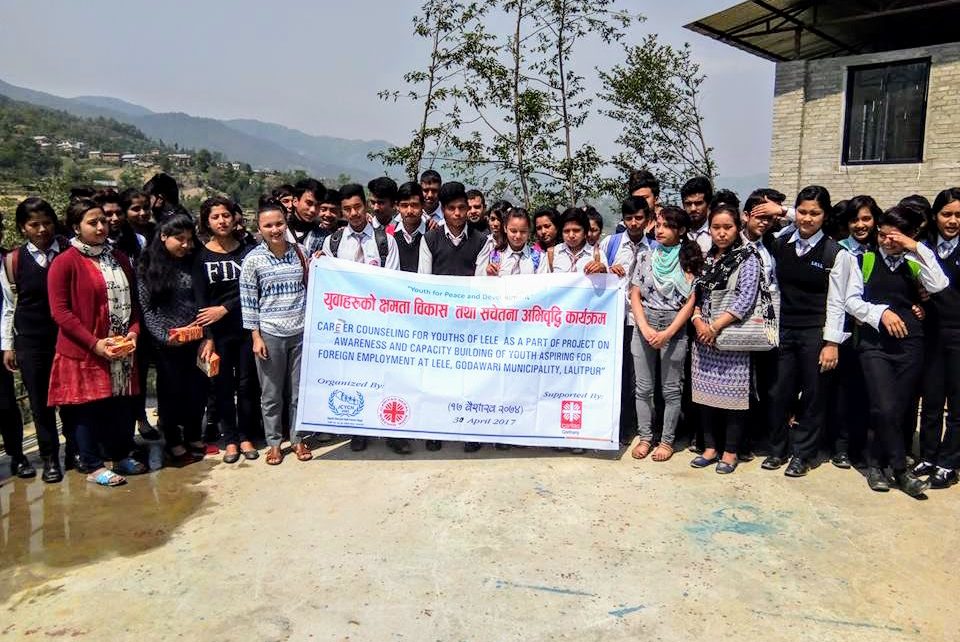Context: According to the 2013 School-to-Work Transition Survey, the youth unemployment rate in Nepal for that year was 19.2 per cent (17.1 per cent for males and 22.2 per cent for females). The share of youth neither employed nor in education/training was 11.9 per cent (7.4 per cent for young men and 17.4 per cent for young women). On average the period needed to complete the school-to-work transition was 6.9 months for young people with secondary or tertiary education and 8.1 months for those with primary education.
Mismatches between the education system and the labour market mean that unemployment in 2013 was higher among young persons with higher education: 22.9 per cent for tertiary educated youth, compared to 10.7 per cent for secondary and 10.8 per cent for primary educated youth. In that year, 40.6 per cent of the employed youth worked as wage and salaried workers, the same figure as for those that worked as unpaid family workers. About 10.5 per cent are own-account workers. Half (50.2 per cent) of employed youth in 2013 were undereducated for their job compared to a 7.8 per cent that were deemed as overeducated. In addition, the Nepalese Department of Foreign Employment notes that between 2008 and 2015 an average 203,000 young people – of which 95.3 per cent were males -annually left Nepal in search of job opportunities abroad, mainly to the Gulf States and Malaysia.
Implementation of programme/ initiative: Awareness and Capacity Building of Youth Aspiring for Foreign Employment (ACBYAFE) is a project implemented by the Nepalese NGO Jagriti Child and Youth Concern Nepal (JCYCN). ACBYAFE provides vocational training and capacity building to unemployed youth on different jobs, including: hotel staffing, tailoring, cooking and plumbing. The primary objective of the project is to empower beneficiaries through skill training and motivate them to find jobs in Nepal or abroad. The project operates in the municipality of Lalitpur and trains 50 youth per year. ACBYAFE is funded by Caritas Germany and Caritas Nepal.
JCYCN is in charge of the selection of both beneficiaries and training centres and covers all the costs of training. Selection of beneficiaries is carried out by an Advisory Committee according to JCYCN’s guidelines and principles. Beneficiaries are selected from vulnerable and disadvantaged communities. The ACBYAFE project is implemented in collaboration with local government authorities at the sub-district level (Village Development Committees or VDCs) and the Secretary of the VDC is a member of the ACBYAFE’s Advisory Committee. JCYCN maps suitable skill training centres in or near Lalitpur. Although the overall training and transportation costs are important factors in the selection of training centres, JCYCN only establishes an MoU with fully certified training centres that share JCYCN’s values and vision. Selected training centres are entirely responsible for the delivery of courses.
Main challenges: The project has faced a number of challenges during its implementation:
- Establishing criteria for the selection of beneficiaries that can ensure, to the maximum extent possible, they complete training courses. To that effect, the Advisory Committee includes, in addition to the Secretary of the Municipality, members from the community such as social activists and health workers.
- Finding certified training centres within a relatively short distance from the home of beneficiaries. For instance, JCYCN has encountered problems finding training centres in ICT. Likewise, the low number training centres in or around Lalitpur and poor transportation facilities have prevented the project to select beneficiaries with disabilities
- Many trainees lack self-confidence and knowledge about their own skills, which has hindered their ability and effort to start a business. This is something ACBYAFE aims to address.
- There have been financial constraints. Most training courses are provided by private centres so costs are high. For example, cooking courses are particularly expensive and cost around US$ 200 per trainee.
Results achieved: In the first stage of the ACBYAFE project, JCYCN trained 20 young people, of which 12 were female and 8 male, and all originated from economically vulnerable communities and disadvantaged groups. During this stage, most courses were on cooking, electrician work, parlour work and tailoring. Although the project aims to provide beneficiaries with the needed skills to work overseas, the first 20 beneficiaries remained in Nepal after the course.
In addition to training, the ACBYAFE project has had spillover effects on other JCYCN activities. Since the implementation of ACBYAFE, several JCYCN clubs have been reactivated after years of low/no activity and started a number of community activities such as building a library and writing community journals.
Moving Forward: JCYCN has plans to extend the ACBYAFE project to other municipalities in Nepal as well as to introduce new courses like additional driving training and development of ICT skills. JCYCN is also looking to establish partnerships with other civil society organizations in Nepal and abroad. JCYCN plans to strengthen existing collaboration with local government authorities and hopes that in the future it can also establish formal partnerships with them. If funding is available, JCYCN plans to double the number of beneficiaries it currently covers and to train up to 300 youth in the next 3 years.
Replicability: The main strength of the ACBYAFE project is its follow up system. JCYCN has established a comprehensive and strict supervision procedure so training centres and beneficiaries receive follow up regularly to ensure that targets are met. Another key feature of ACBYAFE suitable for replicability is its focus on vulnerable communities. The project activities are framed within a fundamental rights approach like the right to employment. Although the project has not been replicated yet, JCYCN has been in talks with local government authorities to replicate the project in the Makwanpur district and potentially other districts.
References:
Background Information on Nepal school-to-work transition: Nepal School-to-work Transition 2013 Survey (2016).
http://www.ilo.org/wcmsp5/groups/public/—ed_emp/documents/publication/wcms_537754.pdf
Government of Nepal. Dept. of Foreign Employment. Labour Migration for Employment: A Status Report for Nepal 2014/2015
www.dofe.gov.np/new/download/download_document/38
Official web pages of JCYCN: http://www.jcycnepal.org.np/
https://www.facebook.com/JCYCNepal/
Acknowledgments:
This good practice was kindly prepared by Dr. Antonio Postigo
Project Details
Date: August 7, 2017
